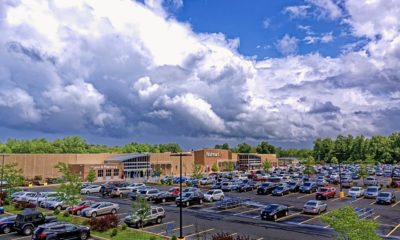Business
Shopping will be less stressful: Walmart files for innovative tracking shopping cart
Walmart shopping carts may soon gather biometric data to find out if a shopper is stressed and alert Walmart employees to assist those who need help.
Walmart has a new offer in store for consumers, but it is not a product—a push cart that can track consumers and gather essential data that can provide better customer experiences. This innovation can lead to lesser stressed consumers and more revenue not only for the retail juggernaut but for other grocery centers as well.
Why focus on lesser stressed consumers? Are not stressed consumers more valuable as they “stress shop”?
Effects of stress while shopping
Interestingly, eating while stressed is different from shopping while stressed. You can eat too much and regret later, but you might buy less than planned while you are stressed.
Shopping while under stressed have a negative impact for both the retailer and the consumer. A case study shows that people who are under stress while shopping tends to be more pessimistic regarding purchases. This hesitant behavior can cost retailers revenue and at the same time decrease the shopper’s chances of completing the shopping satisfactorily.
Assisting shoppers who are stressed can lead to more revenue for the retailer and less cognitive burden for the shopper. However, body language can be misunderstood, or employees may not be near the customer.
Stressed customers are bad news, and one crucial way to convert stressed or hesitant customers would be to provide informed assistance.
Clearly, supermarket chains and other retailers need a reliable information gathering mechanism for shoppers. You cannot solve a problem you do not know. A gap exists between what a customer internally feels and what an employee externally observes.
To combat that lack of information and certainty, Walmart has filed a patent for a shopping cart that reportedly reads the stress levels of shoppers.
Walmart in the retail sector
As of 2017, Walmart takes up 26 percent of the food retailers in the U.S. for both online and offline grocery shopping. That makes Walmart a financial juggernaut at $208 billion out of the $800 billion food retail and grocery market. Even an increase in revenue in the one-digit percentage points can mean savings or earnings of millions.
Walmart may literally be losing millions of dollars to stressed customers, who may undervalue the products in comparison to prices due to high cognitive load due to stress. With 5,358 Walmart stores throughout the U.S. in 2018, upper management has to think of innovative solutions to the problems poised by hesitant customers.
Walmart could be losing millions of dollars in sales due to stressed customers. (Photo by DepositPhotos)
Walmart had already started trying to improve customer satisfaction when they leveled up workers to focus on the more human side while having robots perform the lower-cognitive demands of the job like cleaning and scanning inventory. Currently, 50 Walmart stores join in the robot program, and Walmart may have more stores participate in the future.
Of course, Walmart does not want to rest on its laurels; robots can help from afar, but getting accurate data and then having robots empathizing and assisting might not be a possibility in the near future.
To further improve its system, Walmart filed for shopping carts that track a shopper’s biometrics.
Smart shopping carts
Walmart filed for the patent, which was published on August 23, 2018. Titled as “System and Method for a Biometric Feedback Cart Handle,” the patent details how information moves.
The patent targets explicitly not the whole cart but only the handle. The handle gets necessary biometric information. A standard, called a baseline, is made when the customer first touches the handle. Heart rate and temperature, as well as the force exerted by gripping and the cart speed, are all stored and measured against the baseline from time to time.
The information can give essential data to employees, who can formulate strategies to help. For instance, lesser grip force with slower or even long time of cart inactivity can mean confusion or worse some medical emergencies. Struggling cart pushers, like the elderly or children, may need assistance to get to one location to another. A cart that remains in place for long periods of time can mean the shopper is having difficulty deciding which product to buy. As such, assistants can come to the scene quickly to help.
Are automated shopping sessions the future?
The day when robots may do our groceries may be the norm in the future, but that time is not now. As you can see, robots and grocery handles can process data and report. However, the act of assisting costumers with empathy is still a bar too high for modern robotics.
With this biometric feedback mechanism, Walmart, and hopefully other retailers, can get accurate data to assist people. How the market responds to this new technology remains to be seen, but in theory, a biometric handle is a welcome tool in improving the consumer experience.
(Featured image by Mike Mozart via Flickr. CC BY BY 2.0.)

-

 Crypto1 week ago
Crypto1 week agoIntesa Sanpaolo Signals Institutional Shift With Major Bitcoin ETF Investments
-

 Markets5 days ago
Markets5 days agoRice Market Slips as Global Price Pressure and Production Concerns Grow
-

 Crypto2 weeks ago
Crypto2 weeks agoBitcoin Wavers Below $70K as Crypto Market Struggles for Momentum
-

 Biotech2 days ago
Biotech2 days agoInterministerial Commission on Drug Prices Approves New Drugs and Expanded Treatment Funding

























You must be logged in to post a comment Login